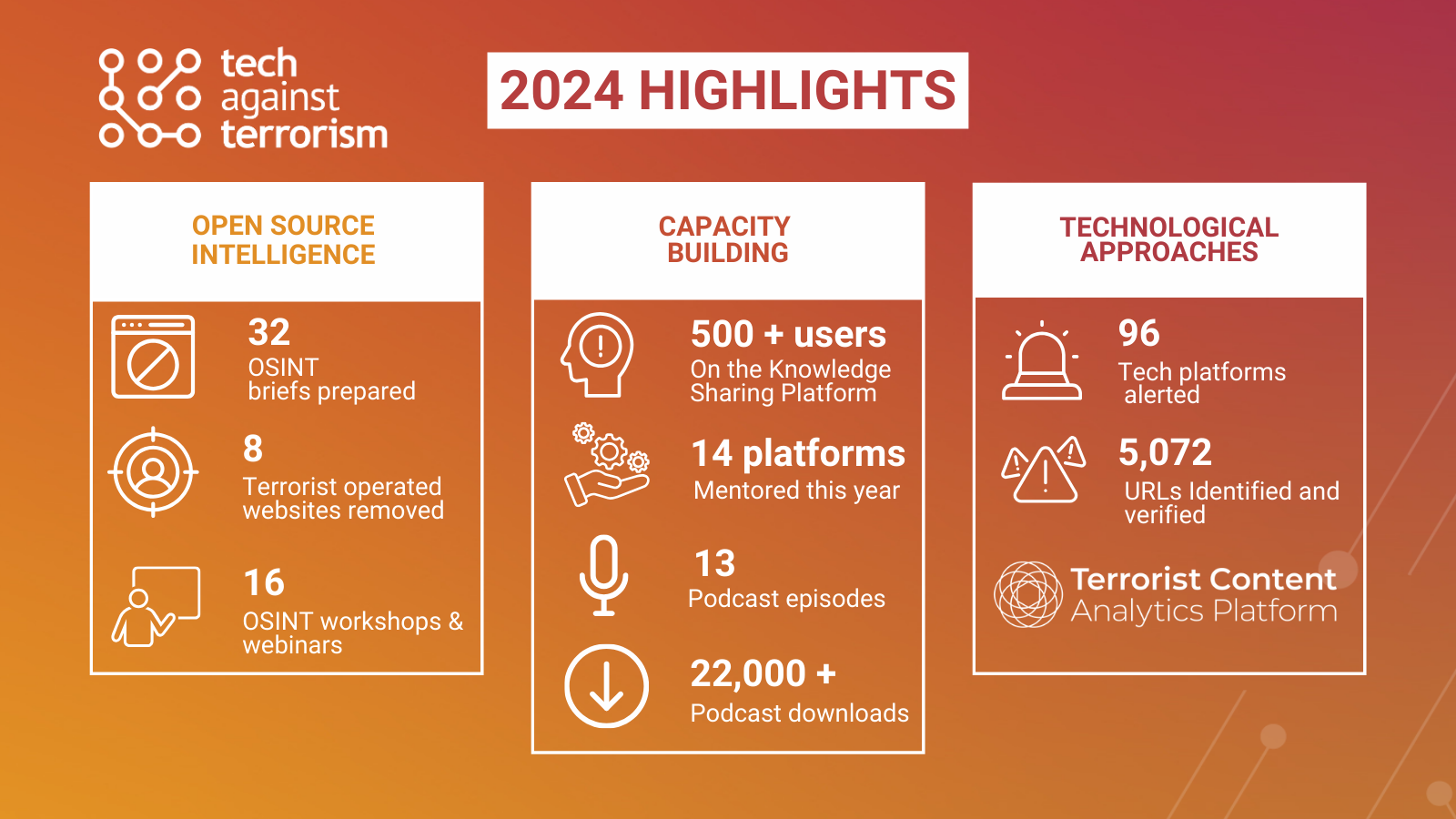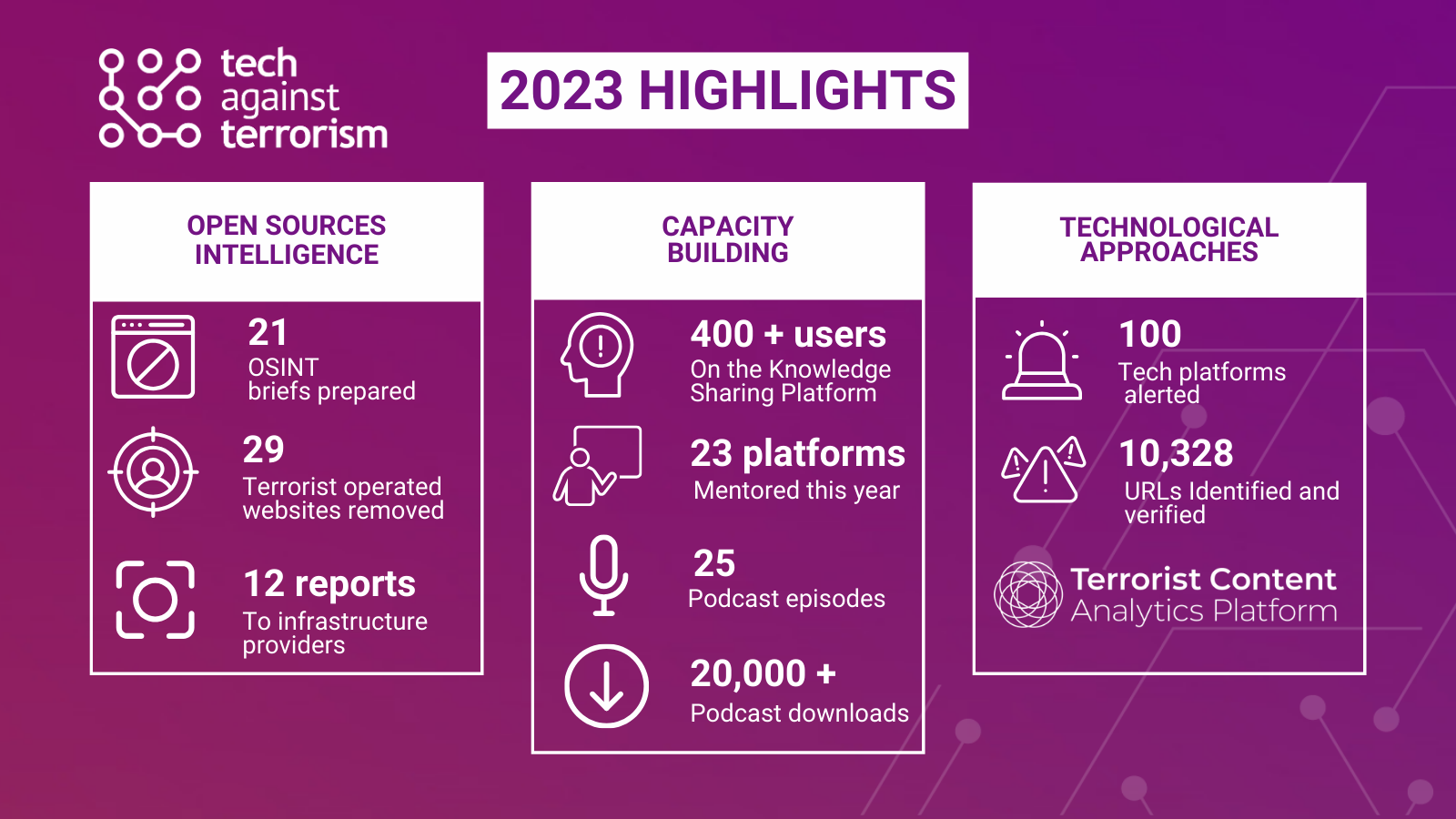Disrupting Terrorism Online in 2024
A review by Adam Hadley CBE, Executive Director, Tech Against Terrorism. Dear partners and stakeholders,
3 min read
Tech Against Terrorism Jan 28, 2024 1:47:00 PM
In 2024, the tech sector will be facing several challenges as terrorist and violent extremists remain determined to exploit their platforms. Here is Tech Against Terrorism’s agenda to stay ahead of the threat.
Tech Against Terrorism is re-affirming its commitment to save lives by disrupting terrorist activity online and upholding human rights.
2024 will be a busy year for Tech Against Terrorism as platforms across the tech sector come to terms with their response to the 7 October attacks in Israel. As the crisis continues and threatens to escalate, and as Generative AI is poised to amplify terrorist and violent extremist content at scale, there is an urgent need for innovative strategies to combat the growing prevalence and sophistication of the threat.
At Tech Against Terrorism, we aim to pioneer technical approaches and seek sustainable solutions for the tech industry and governments alike. Here is what we propose to do in 2024.
Across all our endeavours, Tech Against Terrorism remains committed to employing technological approaches not only to put a stop to the spread of terrorist content but also to leverage technology's potential to disrupt the threat at source.
Last year we announced the launch of collaborative efforts with partners at Microsoft and Google Jigsaw. We hope to see these partnerships come to fruition this year by making crucial tools available for tech platforms.
The uptake of Generative AI is both a threat and an opportunity, and a primary focus of Tech Against Terrorism. As we maintain our vigilance against its early adoption by hostile groups, we also recognise its power to transform content moderation and counterterrorism efforts. Here too there is both risk and potential, and a central concern must be to strike a careful balance between the benefits and risks of generative AI if we are to exploit its transformative potential.
Generative AI
The imminent danger is clear: terrorists will be able to produce more convincing content at scale, in a way they have never been able to do before. Moreover, in a record year of elections taking place around the world, this opportunistic threat overlaps with the spread of disinformation which is already being amplified thanks to Generative AI. A central emphasis for our threat intelligence team will therefore be scrutinising the adoption of Generative AI by extremist entities and advocating countermeasures to our partners.
With widespread interest in Generative AI, we must not lose sight of counterterrorism efforts against existing online threats. For example, as the Middle East crisis unfolds, we have tracked designated terrorist groups, including Hezbollah, Hamas, and the Houthis, not only experimenting with the new technology, but also deploying on established social media channels, apps and openly setting up websites.
Existing threats
Since 2021, Tech Against Terrorism has continually and persistently raised concerns about Terrorist-Operated Websites (TOWs) which continue to be freely accessible to the public with minimal action taken. Even though Tech Against Terrorism’s proactive action has meant that such websites have been regularly taken down, many are often recreated and continue to attract thousands of users. There has never been a greater or more urgent need for coordinated and sustainable action: the adoption of generative AI by terrorists and violent extremists will only amplify this abuse.
Our threat intelligence specialists employ cutting-edge analytics and investigative techniques to track and disrupt online terrorist networks. Tech Against Terrorism will continue its customary technical approach to supporting partners: we will look to expand the development of tools which accelerate monitoring and analysis and experiment with incorporating generative AI to augment their operational power.
The Terrorist Content Analytics Platform (TCAP) is instrumental in helping companies to scale up their ability to identify and eliminate terrorist material. Although more than 100 tech companies already receive TCAP alerts about emerging threats, the TCAP will seek to expand its coverage in 2024 and archive more content forms exploited by terrorists.
We will also seek to expand the scope of the terrorist and violent extremists we cover. In this way, our alert system will enhance automated counterterrorist responses for tech platforms by expanding the available resource of identifiable and actionable content.
The TCAP has become a crucial tool to aid crisis response. We hope we can offer support to other non-terrorist crisis response actions by leveraging the alerting infrastructure of TCAP in future.
Building the capacity of online platforms assumes central importance in 2024. We aim to enable existing crisis protocols and amplify their ability to remove material across smaller platforms.
We are committed to updating training and guidance for companies with the objective of encouraging effective and sustainable action against terrorist abuse of technology.
We already do this through a series of mentorship programmes with tech platforms and through our Knowledge Sharing Platform. However, the tech industry’s response to the 7 October attacks, and the largely unchecked proliferation of terrorist content which ensued online, showed that tech platforms still have a lot to do in connection with the conduct and fall-out of terrorist crises, and that we must do more to help them.
As part of this, we will offer training in open-source intelligence techniques to the regulatory bodies which are concerned with monitoring online content. We will scale up the support for crisis response that we offer through the Tech Against Terrorism Europe consortium, the purpose of which is to raise tech platforms’ awareness of and support compliance with the EU’s Terrorist Content Online Regulation. We will also seek to support and reinforce initiatives sponsored by our partners at the GIFCT, the Christchurch Call, and the UN Security Council’s Counter-terrorism Executive Directorate (CTED) which emphasise the importance of a collective, collaborative, and international response to crisis.
Since we were launched in 2016, we have seen the benefits of effectiveness of cooperation between the tech sector, government, and civil society to counter emerging threats and tactical shifts. There is clearly a lot more to do.
As we look ahead to in 2024 in anticipation of further challenges, we know that our dedication to innovation, vigilant monitoring, and collaborative synergy will enable us to confront and overcome the hurdles rising ahead.

A review by Adam Hadley CBE, Executive Director, Tech Against Terrorism. Dear partners and stakeholders,

17 September 2019 - Press Release: Tech Against Terrorism participates in EU-wide exercise hosted by Europol to tackle terrorist use of the internet ...

A review by Adam Hadley, Executive Director, Tech Against Terrorism. Dear partners and stakeholders,